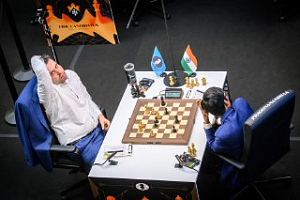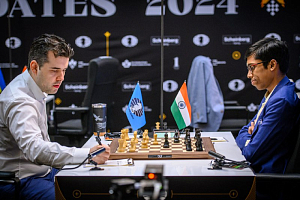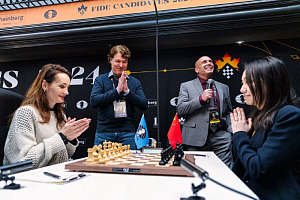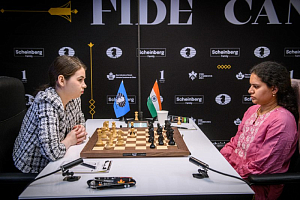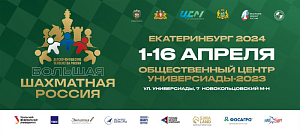Fast and Furious
Superfinals, round 9. Misha Savinov reports from St. Petersburg
Round 9, women
Gunina-Pogonina 0-1, Kashlinskaya-Girya ½-½, Gritsayeva-Galliamova ½-½, Nechaeva-Bodnaruk ½-½, Kovalevskaya-Goryachkina 0-1, Ovod-Shuvalova 1-0.
Current standings:
Pogonina – 6
Kashlinskaya, Gunina, Goryachkina, and Girya – 5.5
Bodnaruk – 4.5
Shuvalova, Nechaeva, and Ovod – 4
Gritsayeva – 3.5
Kovalevskaya and Galliamova – 3
It seems Valentina Gunina can read ahead not only at the chess board. She can see the future, too. Yesterday Valentina saved a very difficult position against Galliamova, but was in a rather melancholic mood afterwards. Apparently, she already sensed that her game against Pogonina will not go in the right direction.
It was a big round in the women's Superfinal, as four players who occupied the top spots were playing each other: Gunina had White against Pogonina, and Kashlinskaya had White against Girya. The latter game ended peacefully in a complex middlegame, which was a bit disappointing, as the position was still full of life. Kashlinskaya got an advantage after the opening, but did not find the way to develop it and decided not to tempt fate, especially considering that both players were under moderate time pressure. Girya did not object to repeat the moves, and a draw was out on paper nine moves before the control.
By that time the main game of the round was already finished. Natalija Pogonina triumphed, despite playing Black, in 21 move – a miniature! Shockingly, Gunina's position was hopeless already on the 13th move.
My friend Leo, who operates the broadcast cameras at the Superfinal, told me during the first break: “I think Pogonina is out for blood. She looks extremely determined, as if she wants to demolish Gunina, sweep her from the board!” He barely plays chess, but he knows people. Natalija was definitely on fire tonight.
The games started with surprises. Valentina does not usually play the Scotch, and Natalija usually prefers 4...Bc5 to 4...Nf6, but this time she decided to duck the opponent's preparation and opted for another main line. Gunina spent a minute on her next move, which basically had no alternative, and then instantly went for a rare 6.Qe2, voluntarily blocking the development of her kingside. Upon seeing this, Pogonina began to think, and after good 23 minutes came up with a stunning move – 6...d5!, a sacrifice of two pawns!
This wasn't prepared at home. Natalija simply wanted to punish White for slow development, discovered an interesting resource and worked out the details in the next 20 minutes. She was very proud of this idea.
“Have you seen my game?”, she asked Ernesto Inarkiev, while they were waiting for transport, and then dictated the moves.
“Oh yes, 6...d5! Such a cool move, one of the new fashions. The sacrifice must be completely sound, since MVL himelf plays it...”
It turned out Natalija re-discovered a move recently played by Maxime Vachier-Lagrave! It goes without saying that Gunina was also completely unaware of this recent theory development.
And the battle began. Black sacrificed two pawns, castled quickly and prepared to bother the white king. White tried to hold the storm, but not all of her moves were perfect, and an attempt to get rid of the nasty pressure over the e-file by 13.Qe3 turned out the fatal mistake. It took just seven minutes for Pogonina to execute the winning 13...Ba6! She placed her bishop en prise, but taking it would cost White a queen. Gunina rejected the offer, but it didn't help either. Black pieces cooperated splendidly, slicing White's position into pieces. Valentina's attempts to protect everything were doomed. She resigned on the 21st move, and it was not by any means premature.
One could call it an opening disaster, but it wasn't about the opening, as neither of them knew much of it. It was about Natalija Pogonina being stronger on this particular day. She was creative, daring, aggressive, and forceful. (It sounds almost like Gunina was playing against her usual self!) If Natalija becomes the Russian chess queen, this game will be a pearl in her crown.
With two rounds to go, Pogonina is leading the field, while no less than four players are half a point behind her. Interestingly, all five leaders have already played with each other. Out of this mini-tournament, Alina Kashlinskaya came out the strongest with 3/4, Pogonina was second with 2.5/4. However, the fate of the championship will be decided in the encounters with those who does not do that well. The unlucky Shuvalova, Gritsayeva, and Ovod will have to meet the members of the quintet twice. The race will be close, and tying for first is by all means possible, which means more nerve-wrecking chess to follow.
Round 9, men
Dubov-Malakhov 0-1, Vitiugov-Inarkiev ½-½, Volkov-Fedoseev 0-1, Svidler-Matlakov ½-½, Romanov-Sjugirov 0-1, Riazantsev-Tomashevsky ½-½.
Current standings:
Fedoseev – 6
Vitiugov – 5.5
Tomashevsky, Svidler, Dubov, and Malakhov – 5
Riazantsev, Inarkiev, and Sjugirov – 4.5
Matlakov – 3.5
Volkov – 3
Romanov – 2.5
All games of the men's event except for the St. Petersburg derby Svidler-Matlakov were rather dramatic, but the main show was delivered first by Dubov and Malakhov, and then by Fedoseev and Volkov. Fedoseev up, Dubov down – that's the essence of the round for the tournament situation.
The game between Dubov and Malakhov started fast and furious. Malakhov decided against repeating his main Slav experiment, clearly expecting some atomic preparation by Dubov. However, Vladimir had no illusions – he knew his pet Chebanenko Variation will also be under fire. And indeed, on the 9th move Dubov demonstrated a powerful novelty, sacrificing a bishop on b5.
According to Malakhov, if Black accepts the sacrifice, he ends up in with a centralized king that cannot castle and no development. The computer considers the resulting position equal, but...
“But it means that Black can just as well resign. So taking the bishop was out of question for me”, commented Vladimir.
He declined the offer and only kept a pawn, but his position looked extremely dangerous. Black castled with a white rook already standing on the semi-open g-file and both white bishops x-raying Black's kingside through the open center. White's setup looked very threatening, Dubov just needed to find the way to make it work. But he didn't.
...When Vladimir Malakhov began showing the game he won, I was once again impressed by how much he saw. The time control used at the Superfinal is not exactly classical, it is “fast classical”. For amateur games it is still unnaturally slow, but when I see how many variations grandmasters manage to calculate and evaluate, I understand what this time is needed for. For Dubov the allotted time was not enough.
On the 18th move, the Muscovite spent 22 minutes and came up with a knight sacrifice. “Even if this idea worked tactically, it would still be wrong strategically”, warned Malakhov. “Starting from the opening, I was mentally preparing myself to getting mated in a brutal way, but after this move I began to feel relief.”
The computer still gives White an advantage after the correct 20.e5, where Black must return a piece, but this was not immediately obvious during the game. Dubov did not find this idea and quickly played the losing move – 20.Qc4? It served no purpose and gave Black time to start a counterattack.
Malakhov kept calculating all the sharp variations with a cool head, and his advantage grew with every move. Dubov, one the other hand, totally lost control, pushing the wood in Black's king's general direction without even creating threats. This was a knock down; Igor Bolotinsky should have started the standing eight count. White resigned on 28th move.
A very sad day for Dubov – one rarely gets a chance to play such a powerful novelty as 9.Bxb5 and to obtain such a promising attacking position. Spoiling it hurts, and spoiling it during a tense race in the Superfinal hurts even more.
But kudos to Malakhov! He had always been a truly resilient defender (his very narrow opening repertoire certainly contributed to that), but nobody would blame his defensive skill if he did not survive Dubov's novelty tonight. Reversing the game was a little miracle. The victory brought Vladimir to joint third place, only a point below the leader. He has a legitimate shot at the title! Finishing within the top three is also desirable, as it secures participation in the Superfinal next year.
As Dubov fell apart, Svidler drew, Vitiugov was half the way to a draw against Inarkiev, who suddenly turned to Karl-Peter Schleko, and Tomashevsky was not getting much against Riazantsev, all eyes were on Fedoseev. Our early leader had Black against Volkov, and his position did not look anywhere near promising until the first control.
I will now pass the microphone to Vladimir, who showed remarkable patience in obtaining an advantage and excellent technique in converting it.
“Daniil and Nikita had promising positions after the opening, and I had nothing, so it is quite surprising to see how it all turned out. I went for the Semi-Tarrasch, in which I had played many blitz games against a strong opponent I do not want to name. I have to say, playing blitz with this opening was more fun than playing classical.
“The game was quite balanced, and White could secure a draw many times, but Sergey played for a win, as he liked his position. This was exactly why we decided to choose this opening: Sergey is a player with principles, he will not trade everything to get a draw, he'll always play chess.
“After 28...Rac8 our assessment of the situation was polar. I thought White takes great strategic risk allowing me to break his pawns, and Sergey thought Black is being fancy and must be punished. I was quite confident I'll be able to pick the c-pawn, and did not see any risk for myself. However, my optimism was somewhat shaken by the terrifyingly strong maneuver 31.Bd1. A very skilled move.
“The critical moment arose right after the control. Before that White defended excellently, however, by playing 41.Qa4, Volkov basically lost the game, as he allows me to pick the c6-pawn by force. The position after the 44th move must be won easily for Black. I just needed to be attentive to traps.
“What a surprise – one can actually play the Semi-Tarrasch for a win!”
“What was the most difficult about this victory for you?”, I asked Vladimir. He contemplated for a few seconds.
“Keeping faith in my winning chances during the middlegame was the most difficult. The position was very balanced, and I did not have much of a play. I had to remind myself constantly that I must keep playing, not taking any draw routes, and the chance will present itself.”
In round 10, Fedoseev has White against Svidler. A more savvy player in Fedoseev's shoes would probably opt for a draw, saving strength for the last round encounter against Romanov. However, Fedoseev does not seem the type of player who likes this kind of strategic thinking. His preferred way of keeping rivals at bay is beating them!
His nearest chaser, Nikita Vitiugov, will play White against the unpredictable Dubov. It may also turn into an entertaining battle. However, in the last round Vitiugov will have Black against a tailender, Volkov, and he may consider sparing energy for that.
Photos by Boris Dolmatovsky


















